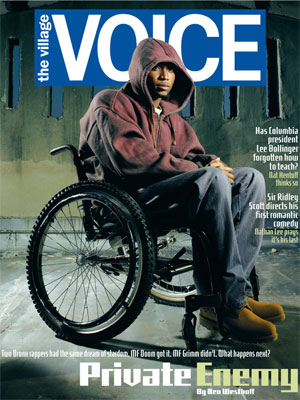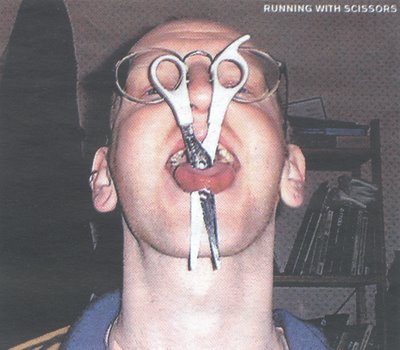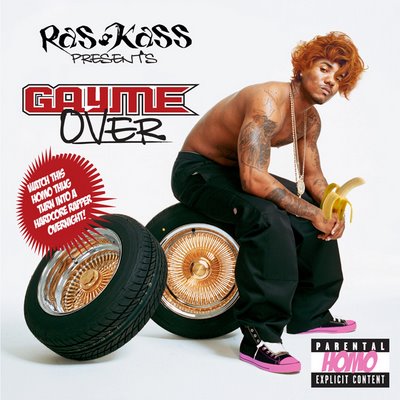VILLAGE VOICE FULL LENGTH...
Private Enemy
Two New York rappers dreamed of stardom.
MF Doom got it. MF Grimm didn't. (NB...GRIMM'S GOT IT NOW!)
by Ben Westhoff
(NB's by Miranda Jane)
November 7th, 2006 1:32
Sometimes you need to cut niggas off like a light switch. MF Doom, 'Deep Fried Frenz'
I don't deep-fry friends/Grimm Reaper nuke 'em/Hearts don't mend/Brothers turned to enemies, nigga/Enemies I eat them raw, nigga/MF Grimm is god of war. MF Grimm, 'Book of Daniel'
Percy Carey is a strong man. The 36-year-old South Bronx rapper, known professionally as MF Grimm, has broad shoulders and chiseled arms, the result of a daily routine including sit-ups and push-ups; he also regularly wheels himself six to eight miles in his wheelchair. Once an NFL-caliber outside linebacker and middleweight boxer, Carey was shot and nearly killed by rival drug dealers in 1994. He eventually recovered his vision and speaking ability, but he may never walk again. "I wronged a lot of people, but it's balanced out," he says. "And that's why I can live with myself in this chair."
Although Carey was once poised for mainstream success, his years as a drug-dealing thug led to a lengthy imprisonment, stunting his rap career while friend and onetime recording partner MF Doom was blowing up as a simultaneously whimsical and menacing underground supervillain. Now Carey feels that Doom has forsaken him, and he's fighting back with a dis track, a triple album, and a multifaceted company hawking everything from horror movies to energy drinks.
For a man who calls himself Grimm, Carey is optimistic, but he knows things could've been different. He grew up in a loving middle-class family on the Upper West Side. "I had decent parents that would always try to do for me," he recalls. "From a young age, I was taught right from wrong, how to be a man, to be a hard worker." Morgan Freeman, the family's next-door neighbor, quickly put Carey to work; the actor thought a three-year-old Percy—who then had an Afro and a potbelly—would look great on Sesame Street's stoop. Freeman put Carey's mother in touch with the show's producers, and for the next four years Percy regularly held court with Oscar the Grouch, Mr. Snuffleupagus, and the gang. "One episode, I lost my tooth, and me and Big Bird had to go through Sesame Street and try to find it," Carey remembers.
As a teenager, he spent countless hours at his friend Jorge Alvarez's 97th Street apartment. The guys played video games, smoked weed, and honed their rapping skills. Eventually, a young man from Freeport, New York, named Daniel Dumile joined their rhyme circle, well on the path to becoming MF Doom.
"Doom was more conscious at that time," Carey remembers. "He stood for something big. He was for black culture. I rhymed about beating people up, about shooting at people, trying to make money."
Guns and drugs were quickly becoming his reality. As a Park West High School student, Carey rarely went to class, preferring to shoot dice in the hallways, get high in the bathrooms, and chase girls everywhere. He was expelled for assaulting a school dean: "We beat him up in the snow. He was on drugs, and he owed us money for dope. So we kicked his ass."
In the following decade, Carey built a mini–drug empire and a reputation for shooting enemies without remorse. "He was a fucking murderer. What do you want me to say?" longtime friend Sebastian Rosset recalls. "I have other friends that are a little less organized with that shit. He was a little more organized."
Nonetheless, rap remained a passion, and Carey spent increasing amounts of time making music with Dumile. Influenced equally by the styles of KRS-One and Dr. Dre (both of whom he eventually collaborated with), Carey tells straight-ahead gangland narratives in his raps, peppered with political—and at times New Agey— messages. With Dumile, he formed a clique, Monsta Island Czars (M.I.C. for short), named after the mythical home of Godzilla. For stage names, Grimm and Doom shared the "MF" prefix, which Carey says stands for "Mad Flows" or "Mother Fucking." After Dumile began wearing a mask, it took on another meaning: "Metal Face."
During the late '80s, Dumile founded the group K.M.D. with his brother Subroc and had a minor hit with "The Gas Face," a collaboration with affiliated group Third Bass. K.M.D.'s playful, politically conscious debut, Mr. Hood, came out on Elektra Records in 1991, but tragedy befell the group two years later when Subroc was struck by a car and killed. Shortly thereafter, Elektra dropped K.M.D. and refused to release their second album, Bl_ck B_st_rds, which featured an African American cartoon figure hanging from a noose.
Alone and depressed, Dumile disappeared from the music scene for five years, turning to Carey for support. "Things was on the downslope," Dumile admits, on the phone from his Atlanta studio. Carey is "like a brother," he says. "We've been through so much hard times. When we were both struggling, we had each other to lean off of."
Things got worse. On a snowy January day in 1994, shortly after getting his hair cut in Harlem, Carey stepped into his stepbrother Jansen Smalls's car en route to a meeting with an Atlantic Records representative, who was courting Carey for a record deal. But just as Smalls turned the ignition, bullets riddled the car, puncturing Carey's left arm, gut, neck, and lungs. Smalls was killed instantly.
"It was a blizzard, and snow was all over the windows, so I couldn't see much," Carey recalls. "There were several different people shooting, and the whole car was annihilated. I don't know who shot me. I was dealing, and when you get to a certain plateau, everyone knows you, though you might not know who they are. They think that doing something to you will benefit them, whether it's for a rep or financially."
At Harlem Hospital Center, doctors ripped open his rib cage to remove bullets, and for months afterward he couldn't see, hear, or talk properly. Spinal cord damage confined him to a wheelchair, and larynx damage affects his speech to this day. But his afflictions didn't stop him from dealing dope. Five years later he was pinched on narcotics and illegal-firearms charges and imprisoned for three years. Upon his release in 2003, Carey pledged to reform his ways and had reason to believe things were looking up.
During Carey's incarceration, Dumile found success as a solo artist, assuming aliases from Viktor Vaughn to King Geedorah and collaborating with increasingly famous artists. (His next album, slated for release in early 2007, will be a collaboration with Wu-Tang Clan's Ghostface Killah.) Known for his dense flow and intelligent wordplay, Doom's become a hero or villain to hip-hop heads worldwide. His 1999 debut album, Operation: Doomsday, was a big seller by indie standards, and Carey, who, before his incarceration, helped finance the album and supplied samples in his role as executive producer, expected fat royalty checks. More importantly, he and Dumile could resume making groundbreaking music together, now with an audience to receive it.
But it wasn't to be. Dumile had left his friend in his dust. He says they grew apart, but Carey feels betrayed. "I consider him a brother to me, and it shouldn't have gotten to the point where it's at," he says, adding that his visionary former friend has changed.
"Sometimes the line of genius and acting crazy is so thin, you might fall over the line and need someone to bring you back." Carey's modest apartment in a gentrifying South Bronx neighborhood overlooks basketball courts, a concert pavilion, and rows of tidy houses. From the pale brick building's open windows, mothers yell in Spanglish for their kids to come home for supper. Inside, his abode is a shrine to hip-hop and comics. Action figures still in their plastic cases line the walls à la The 40-Year-Old Virgin. Most belong to Carey's roommate, rapper Robert Warfield, who became a member of M.I.C. in 2003, around the time Dumile dropped out. Warfield, a lanky Puerto Rican, plasters Transformers stickers on his recording equipment and assists Carey when he needs it, both with his record label and in pushing him up steep hills or lifting him up out of his chair when he needs to zip up his pants. Though Carey navigates the world with the relative ease of a man who's spent one-third of his life in a chair, there are still a few spots beyond his reach.
"There's nothing cool about being shot," Carey says. "It hurts. It changed not just my life, but also the ones around me. People have to help take care of me. I can't do shit on my own sometimes."
On this drizzly late-September day, Carey sits atop a towel in his black wheelchair. He rolls himself out into the hallway at the request of a photographer named Dumas, who has come all the way from Brussels, Belgium, to take his picture for an Internet site called 90bpm. ("Le 1er magazine de la culture Hip-Hop en France depuis 2000.")
Carey has dark skin, a thin goatee, and a muscular upper body that looks like it could still absorb punches. From beneath a backward-tilted ball cap, his deep-brown eyes stare menacingly back at the camera. He doesn't smile. But immediately after the shutter snaps, the veneer fades. "You got enough light?" he asks.
Though even now his lyrics don't always reflect it, Carey has renounced his violent past, and he's exceedingly polite. He calls men "sir" and women "ma'am." His deep voice contrasts with his still childlike personality—he prefers candy to beer and remains a comic-book fanatic.
It was his interest in superheroes like Superman and Green Lantern, in fact, that helped convince DC Comics to publish his life story as a graphic novel. Next fall will see the worldwide debut of Sentences: The Life of MF Grimm. Written by Carey and illustrated by Brooklyn artist Ronald Wimberly, the book will be released on DC's Vertigo imprint, known for titles like V for Vendetta and the Sandman series.
"There's a lot in common with comics and music, in particular the underground aspect of it," says Vertigo executive editor Karen Berger. "Certain songwriters, certain hip-hop artists, they're storytellers. That's the beauty of it. Percy has so easily moved from writing songs to writing a graphic novel. He's a great storyteller, and he's now found another medium to tell his stories."
Carey and Berger are also in talks to develop a comic series called Candy Land, set in an urban ghetto controlled by gangs of sugar-filled personalities. "There's a crew called the Donuts, led by Choco, a chocolate donut," Carey explains. "Chewy P. Newton, he's the political one, and tells kids they shouldn't be out there using bleached flour and refined sugar."
Comics aside, Carey's days are dominated with running the company he founded in 1999, before he went to prison, Day by Day Entertainment. Its musical arm has become a major independent hip-hop player in recent years, securing worldwide distribution and selling nearly 100,000 units by Carey's count. That figure includes 10,000 or so of an MF Grimm–MF Doom collaboration called Special Herbs and Spices, Volume One, released in 2004 though produced years earlier.
Originally conceived as a vanity rap label (NB...I DON'T THINK PERCY AND I WERE VAIN AT ALL IN IT'S CONCEPTUALIZATION!) Carey's release from prison three years ago Day by Day has taken on more than two dozen artists (Rob Swift, Hasan Salaam, Mudville) and now features a successful rock 'n' roll division (Serengeti, the Shadow). Carey is also in discussion with Verve to collaborate on a pair of jazz albums. Day by Day's film division is set to release a low-budget, straight-to-DVD Australian horror movie called When Evil Reigns. Finally, there's an energy drink called MF Potion in the works, not to mention a makeup line featuring lip gloss, blush, fragrances, and soap.
"There's not a lot of products for women of color, from my understanding," Carey says. "It has to do with the pigments. A woman my complexion, normally, whatever type of makeup they use has elements of pink in it. But they need something that's based in yellow."
Expect Day by Day cosmetics at a store near you this summer.
His varied projects aside, Carey's focus for now is his own new triple CD American Hunger. After spending much of the '90s working on other people's projects (he wrote songs for Kool G Rap's classic album 4, 5, 6 and, he says, Dr. Dre's The Chronic, though he's uncredited for his work on the latter), it's his fourth solo album, following The Downfall of Ibliys: A Ghetto Opera, Digital Tears, and Scars & Memories.
Released in July, Hunger is among the most ambitious projects in rap history, featuring 60 tracks, including collaborations with hip-hop royalty like Large Professor and PMD of EPMD. At its heart a pop album, it sashays between themes of love and loss, redemption and revenge, flirting with the political but finally settling on the personal. "Trapped in the belly of the beast/Trying to get regurgitated because I am the feast," Carey raps on the first of the album's three title tracks.
Making a three-hours-long album is, of course, insane, but Carey somehow makes it work, partially through his compelling story and partially by stacking the deck with top-notch underground beat-makers like St. Louis's DJ Crucial, who plans to release his own album featuring the 12 songs he produced. "I was told it could not be done, but I like to do things people say can't be done; gives you a reason to still be on the planet," Carey says. "They can say the other 59 of them suck, but if somebody likes one song, I'm happy." (American Hunger is available at daybydayent.com for $13.50.)
A recent, largely praiseworthy Spin print review called Carey "the rapper who's taken almost as many bullets as 50 Cent." Wrong. "He was shot nine times, and I was shot 10 times," Carey grumbles, referring to both the crippling 1994 assault and a 1986 party in which he was shot in the stomach, knee, and wrist.
The Spin review also notes the album's Molotov cocktail of a final song, "Book of Daniel," which threatens Dumile by his first name and his stage name from his K.M.D. days: Zev Love X. "Zev Love X used to be merry/The mask took control of you like Jim Carrey," Carey raps over a blistering acid-rock sample, adding: "When the bullets start flying, who's gonna hide you?"
"You ain't a man/You a character," puts in crewmate MF Mez, adding, "M.I.C. gave you life/And we can take that shit away."
"Book of Daniel" is a response to a track on Doom's biggest success story to date: The Mouse and the Mask, his 2005 collaboration with superstar producer Danger Mouse, he of the Beatles/Jay-Z mash-up The Grey Album and this year's buzz phenom Gnarls Barkley. A goofy, literally cartoonish venture featuring the voices of the Cartoon Network's Adult Swim stable (itself a favorite of Doom's largely white, frequently stoned fan base), Mask was a critical and commercial smash. The Washington Post called it "the craziest, coolest CD of the year," and it reached 41 on Billboard's album chart.
On the Mask track in question, "El Chupa Nibre," Dumile obliquely references his past: "Once joined a rap clique, Midgets into Crunk/He did a solo on the oboe, could have sold a million/Then the Villain went for dolo and cited creative differences."
Carey sees the "Midgets into Crunk" line as a dis of M.I.C. "I view 'Midgets' as saying he's big-time and we're small. And he probably thinks crunk is like a fad, so that's just his way of saying we're out of here."
"I never looked at it like that—if I want to dis niggas, I'll say it straight up," Dumile responds. "But, if the shoe fit . . . you know what I'm saying? People can take it how they want to take it. If somebody feels offended by it, that's on they own self."
Whether or not Dumile intended to hurt him, Carey reacted viscerally and immediately crafted a response. "He just gets in [the studio] and starts ripping this verse, and I'm just like, 'Oh my gosh!' " recalls producer DJ Crucial. "I'm looking around at everyone, 'cause Doom is like everyone's favorite right now."
"Book of Daniel" has listeners around the country duking it out on Internet message boards. Some see Carey's rage as justified, while others find the song a pathetic attempt to cash in on Dumile's celebrity. "Maybe Grimm looked at his sagging sales and said, 'Damn, I need to start a beef with someone,' " reads a comment to a blog posting about the song written by someone calling himself "i'm the skwidawd."
Carey insists "Book of Daniel" is not a publicity grab. "I do mean what I say. If I'm going to kill somebody, I'm gonna kill them. Am I looking to go hunt him down and kill him? Nah. But can it get to the point where someone could get hurt? Yeah. It's about respect. People get beat up for less."
So-called "dis tracks" are commonplace in rap music, of course. But "Book of Daniel" is different. When Carey isn't threatening Dumile, he's appealing for reconciliation. "Come home, Zev," he pleads near the song's end. "I can't act like I don't have no love for him," Carey says now. "I care about him so much that it caused the conflict that we have today. The more I speak about him, the more it becomes to the world like I'm bitter toward his success. He was bound to be successful, but the plan was for him to direct that success toward the others. If our plan is to get up over a wall, and I push you up and help you get over the wall and you don't throw a rope for me, then it's going to be an issue."
Dumile hasn't heard the song, but says he has no time for Carey's issues.
"It's funny, how, once it gets to where the name is getting recognized, everybody want to act like they got a problem with the Villain," he says. "I ain't got no friends. As soon as you think somebody's your friend, that's when you gotta watch out. When you're successful, there's always somebody that's cornering you, somebody that used to be your friend, talking about, 'He did this, he did that.' I open up my home to people, help people, and then motherfuckers turn around and try to stab me in the back." (NB...HMMM...SPEAKING OF OPENING UP YOUR HOME TO PEOPLE AND HELPING THEM THEN THEM TURNING AROUND AND STABBING YOU IN THE BACK, DANIEL DUMILE THOMPSON...ISN'T THAT EXACTLY WHAT HAPPENED TO ME IN BROOKLYN?!)
Out on bail and awaiting trial for narcotics and weapons charges, Carey made a risky move in early 2000. Lacking a driver's license, he bought a fake one and used it to board a plane to Los Angeles.
There, he met Dumile. They came to negotiate with executives from Readyrock Records, who planned to release MF Doom's solo debut, Operation: Doomsday, and K.M.D.'s second and final album, Bl_ck B_st_rds. Carey contributed financially to and is credited as an executive producer on both albums.
Carey hadn't seen his friend in a while, as Dumile had moved to suburban Atlanta with his wife and their young son, Daniel Jr.—Carey's godson. After the meeting, the two men revived their bond and, stepping into a record studio, quickly recorded hours of songs, one of which Carey would use for Grimm's own The Downfall of Ibliys: A Ghetto Opera, which was dedicated to stepbrother–shooting victim Jansen Smalls. "I expected me and Doom to make good music and become legends," Carey remembers of the session.
Miranda Jane, a Los Angeles–based music consultant, came to the studio to interview the guys for Stress, a now defunct hip-hop publication subtitled "NY's Illest Magazine." She even brought along dinner for them: homemade jambalaya and smothered cabbage. "They had a really good synergy together," she recalls.
Jane, who later became Dumile's manager, was one of last people to see his face. Since Operation: Doomsday, MF Doom has taken to wearing a metal gladiator mask onstage, in press and album photos, and even in everyday life around people he doesn't know very well. "Hip-hop tends to be about who's the flyest, who has the biggest chain," Dumile explains. "So it's kind of like the mask is the opposite of that. It's like, it don't matter what he looks like, what race he is. All that matters is the vocals, the spit, the beats, the rhymes."
The mask has metaphorical implications as well, Jane says. Having been scarred by the music industry, Dumile was reinventing himself as someone who wouldn't be played for a fool. "Doom was concerned with making money right now and feeding his family by any means necessary," she says, adding that this differed from Carey's long-term goal of building a black-owned distribution company from the bottom up.
"I got a different agenda," Dumile agrees. "It's about getting money, and that's that. I got children to feed." As for Carey: He "ain't got no kids." (NB...YOU'RE RIGHT, DOOM, HE DOESN'T. NOR DO I. I HOPE THAT IN YOUR HEART AND SOUL YOU REALIZE THAT OUR FAMILIES ARE JUST AS IMPORTANT AS YOURS. THAT'S WHY YOU FEEL GUILTY WHEN YOU LOOK IN THE MIRROR AND ANOTHER REASON YOU HAVE TROUBLE SLEEPING AT NIGHT.)
Shortly after the L.A. meeting, Dumile returned to Atlanta, and Carey to the penitentiary. During his three-year confinement, he was transferred to institutions all over New York State. "I've been moved and moved. . . . Most of them wasn't wheelchair accessible," he says.
"I remember visiting him up in Fishkill, New York, and the facilities were a little better," recalls Elinor Tatum, a friend. "But he told me about how, before, he'd basically had to crawl to the shower. In another case, medical staff didn't want to have to change his catheter, so they gave him a drug that kept him from having to urinate. He got very ill because of it, because he was not eliminating the way he should have been."
Yet Carey found ways to make the most of a miserable situation, working on his chess game, teaching himself to cook, and studying the music industry.
"I got my hands on Billboard, Forbes, Fortune—anything that dealt with marketing," he says. "And I learned the business models of people like Quincy Jones, Russell Simmons, Tommy Mottola, and Jimmy Iovine. I basically took my years in prison and I used it as college."
Dumile visited him only once during that stint. Adding insult to injury, upon Carey's 2003 release, Dumile told him that the album deals with Readyrock had fallen through. He'd struck new deals to release Operation: Doomsday and Bl_ck B_st_rds, but they would pay the two men only a fraction of what was guaranteed by the original agreements.
"Dumile promised that he was going to do something to make it right, to get some thing to me," Carey says. "But he never did."
Answers Dumile, "It's funny how motherfuckers want to complain about how 'The Villain jerked me, and this and that.' I'm like, 'Get a lawyer!' " (NB...DOOM, ARE U, LIKE, "GET A LAWYER"?! REALLY. WHAT KIND, ENTERTAINMENT OR IMMIGRATION? CIVIL OR CRIMINAL? SPEAKING OF LAWYERS, ARE ALL OF YOUR LAWYERS IN TOUCH WITH SADE'S PEOPLE? ANITA BAKER'S? ALL THE OTHER PEOPLE YOU'VE SAMPLED? THIS COULD REALLY BECOME A TOUCHY ISSUE, THAT'S THE THING ABOUT LAWYERS, THEY BEGET OTHER LAWYERS...IT BECOMES QUITE THE QUAGMIRE.)
Nonetheless, Carey was willing to let bygones be bygones, and he thought Dumile felt the same way when he invited Carey to perform at an MF Doom concert at Times Square club B.B. King's last year.
"I wasn't going to do any more shows," Carey says. "It's a very uncomfortable feeling sitting down and having to rhyme. It's like boxing—you don't want to be a boxer in a wheelchair. You want to stand up and fight."
But the chance to be with Dumile was more than he could pass up, and in a video of the concert DVD Carey has, he looks as happy as a kid at his first baseball game. "All the people on the sides know MF Doom is hot, MF Doom is hot, MF Grimm is hot," Carey raps from his chair at the beginning of the show, wearing a heavy sweatshirt and winter cap. "This is my brother, I love him," he adds as the lights are cut and Dumile bounds onto the stage, clad in a Patrick Ewing Knicks jersey and, of course, his silver mask. He continuously shouts out Carey throughout the set, using his other stage names, Jet Jaguar and Grandmaster Grimm.
"It felt good being onstage with him," Carey recalls. "It was good to see him rock. And after that, I thought we would be back to normal. It's apparent that he didn't think so." Carey heard "El Chupa Nibre" shortly thereafter and became convinced that Dumile had fundamentally changed since their days as teenagers on 97th Street. "I think he's caught up in an image he can't escape from. He has to be a villain."
Dumile doesn't entirely disagree. "The whole Villain thing is really like looking at how other people see him," he says. "The oppressors usually look at the people they're oppressing as the villains. But the oppressed are the heroes to the people, so I just accept it now. I'll be the villain. I'll be the hero to the hip-hop world." (NB...SO WHAT YOU'RE SAYING IS THAT YOU'RE THE OPRESSOR. I'M GLAD YOU ARE AWARE THAT YOU'RE OPPRESSING THE PEOPLE WHO'VE WORKED TO HELP FURTHER YOUR CAREER, ESPECIALLY THE ONES WHO'VE HELPED YOU WITH YOUR RHYMES OVER THE YEARS AND WHO'VE DONE FLAVOR VOCAL APPEARANCES ON YOUR PROJECTS OR BEEN 9/10THS OF THE GROUPS YOU'VE PUT OUT UNDER YOUR AUSPICES.)
Carey's apartment is full of cardboard boxes, some packed with promotional T-shirts and copies of American Hunger. Others are troves of old mementos. After digging around for a few minutes, Carey produces old copies of Right On! magazine, a locally based hip-hop fanzine aimed at young girls in which he once authored a column called Grimm Reaper's Harvest. Also in the boxes are photos from Carey's Sesame Street days and a picture of him standing with DJ Roc Raida in the early '90s, before Carey was paralyzed.
Eventually, Carey packs up the boxes and puts them away, along with the Doom concert DVD. The sun has gone down in the South Bronx, and the interview is almost over. But before that happens, he'd like to show off a new trick he's been working on.
"I'm learning how to stand up," he says, moving from his wheelchair to a leather recliner and motioning for Warfield to hand him his aluminum walker. He grasps the walker's soft handles and, trembling, pulls himself up. After a few seconds of struggle he extends, fully vertical, his muscular arms supporting his underdeveloped legs.
"I fully expect to walk again, but it's difficult for me to put a timetable on it," Carey says, after sitting back down. "It's not my body anymore. My body's back. It's just, there's a lot of things I've got to overcome in my mind."
(NB...IT'S NOT ABOUT MIRANDA JANE, IT'S CERTAINLY NOT ABOUT DOOM. IT'S JUST ABOUT PERCY "GRIMM" CAREY...THE MAN, THE MYTH, THE LEGEND. WE'RE DONE WITH DOOM, UNLESS SCOTCH COMES BACK AND WANTS THE MASK BACK. THE FIRST SHALL BE LAST, AND THE LAST SHALL BE FIRST. NEXT UP...TRUNKS. CHECK OUT A TRUE MC & LYRICIST ON THE
HIP HOP GAME AUDIO SECTION - THE TRACK IS CALLED "DANCES WITH WOLVES" F/TEK & STEELE OF SMIF'N'WESSUN AND KARDINAL OFFISHAL FROM THE FORTHCOMING LP, "BRASS KNUCKLE BULLIES", A&R DIRECTION BY MIRANDA JANE...2007 WE ROCK ON. 11)
















